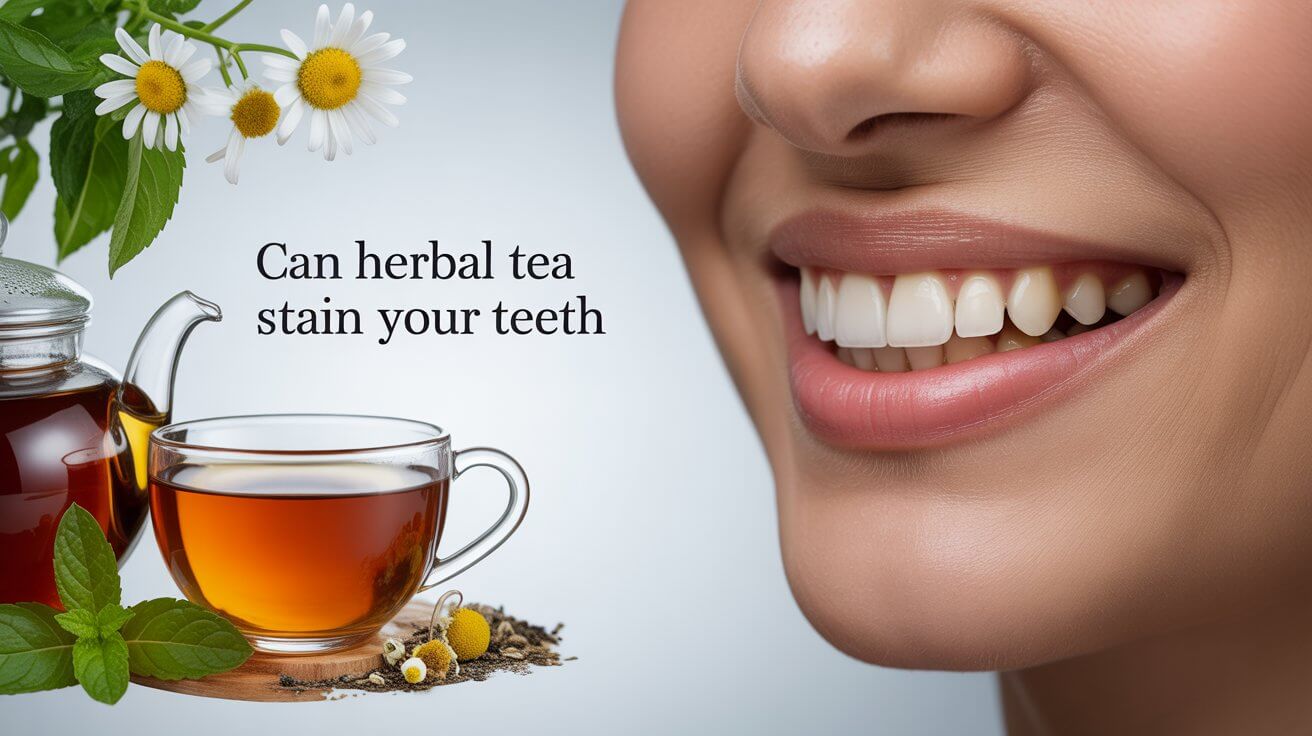Herbal tea has become a favorite alternative to coffee and traditional teas, thanks to its soothing flavors, caffeine-free nature, and numerous health benefits. From calming chamomile to refreshing peppermint, these natural infusions are often seen as part of a clean and healthy lifestyle.
However, many tea lovers wonder can herbal tea stain your teeth? And if so, how can you protect your bright smile without giving up your daily cup?
In this guide, we’ll explain why herbal tea can sometimes discolor teeth, which types are more likely to stain, and how to enjoy tea safely while maintaining white, healthy enamel.
Why Does Tea Stain Teeth?
To understand whether herbal tea stains teeth, it helps to know why tea in general has this effect.
Traditional teas like black, green, and oolong contain tannins natural compounds that cling to tooth enamel and gradually create a yellow or brown tint.
Additionally, dark pigments and acidity can weaken enamel, allowing stains to form more easily.
While herbal teas are naturally caffeine-free and typically lower in tannins, certain blends still contain deep pigments from plants, berries, or flowers that can cause slight discoloration over time.
Can Herbal Tea Stain Your Teeth?
Yes, herbal tea can stain your teeth but usually to a lesser extent than black or green tea.
The likelihood depends on two key factors:
-
Pigment Concentration: Teas made from deeply colored herbs or berries are more likely to leave marks.
-
Frequency of Consumption: Drinking multiple cups daily can gradually build up mild stains.
Light-colored teas like chamomile or ginger are less likely to discolor enamel, while darker or richly pigmented blends may cause noticeable changes over time.
Herbal Teas More Likely to Cause Stains
Certain herbal teas contain natural pigments that can cling to enamel and dull your smile. Here are a few common examples:
-
Hibiscus Tea: Its deep red color is vibrant but can leave pinkish stains with frequent consumption.
-
Rooibos Tea: A reddish-brown South African tea that may discolor teeth over time.
-
Berry-Based Teas: Infusions made with blueberries, blackberries, or elderberries carry dark purple and blue pigments that can stain enamel.
Herbal Teas Less Likely to Stain Teeth
If you want the benefits of herbal tea without worrying about discoloration, these light-colored options are ideal:
-
Chamomile Tea: Pale yellow and gentle on both the stomach and teeth.
-
Peppermint Tea: Refreshing, cleansing, and very low in pigment.
-
Lemon Balm Tea: Bright and mild with little staining potential.
-
Ginger Tea: Light golden in color, rich in antioxidants, and easy on enamel.
These teas not only minimize staining but also offer digestive, calming, and immune-boosting benefits.
How to Prevent Herbal Tea Stains on Teeth
You don’t have to give up your favorite brews to maintain a white smile. Follow these easy preventive steps:
✅ Rinse After Drinking: Swish your mouth with water immediately after finishing your tea.
✅ Use a Straw: For iced herbal teas, use a straw to reduce enamel exposure.
✅ Maintain Oral Hygiene: Brush twice daily with a whitening or fluoride toothpaste and floss regularly.
✅ Get Professional Cleanings: Schedule dental cleanings every six months to remove surface stains.
✅ Alternate Teas: Balance darker teas with lighter blends throughout the week.
Balancing Dental Health and Herbal Tea Benefits
While herbal tea may cause mild staining, its overall health benefits often outweigh cosmetic concerns. Herbal teas are hydrating, caffeine-free, antioxidant-rich, and support relaxation and digestion.
If you want a tea that supports wellness without compromising your smile, consider trying All Day Slimming Tea a blend of natural herbs that promote metabolism, digestion, and detox, while remaining gentle on enamel and gut health.
Conclusion: Can Herbal Tea Stain Your Teeth?
So, can herbal tea stain your teeth? Yes but the extent depends on the type and how often you drink it.
Dark herbal teas like hibiscus, rooibos, and berry blends can cause mild discoloration, while lighter options such as chamomile, peppermint, and ginger are much safer for your teeth.
With a few mindful habits and smart choices, you can enjoy the calming ritual of herbal tea and maintain a bright, healthy smile naturally.


Leave a Reply